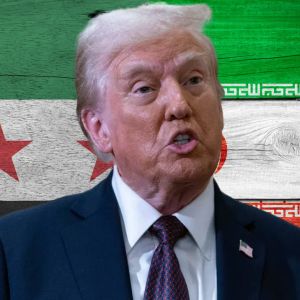US eases Syria sanctions imposed after Assad’s fall to rebel forces
3 min read
The United States has started lifting some of the longest-standing sanctions on Syria, after President Donald Trump met with the country’s new leader, Ahmed Al-Sharaa, in Saudi Arabia last week. The Treasury Department made the move official on Friday, labeling it “immediate sanctions relief.” These were sanctions originally enforced during the Assad dictatorship, which collapsed last December when rebel forces seized Damascus and forced Bashar al-Assad to flee to Moscow, ending nearly 14 years of civil war. According to the announcement , Trump’s administration is attempting to open up Syria’s economy for investment while keeping several core restrictions in place. Although the president has the authority to cancel executive orders, many parts of the sanctions, especially the 2019 Caesar Syria Civilian Protection Act, still require Congressional approval to be removed. That Act punishes any attempt to conduct business with the Syrian government, unless it’s strictly for humanitarian purposes. Trump team pushes for waiver, Rubio outlines 180-day plan Secretary of State Marco Rubio stated that the administration is applying for a 180-day waiver to buy time while working with lawmakers to repeal the broader legislation. The move is being framed as part of a larger strategy to bring back economic activity without immediately clearing the country’s name. Trump’s decision followed a high-level meeting with Sharaa, who came to power after leading a successful offensive against Assad. Sharaa was previously a commander of an Islamist-run zone in northwest Syria, and many of his key allies, including Shaibani, are former militants linked to Al-Qaeda-affiliated groups. The United Nations Security Council has already flagged members of the new Syrian administration in connection with war crimes during the civil war. The concern is less about strategy and more about who exactly is running the new Syrian government. While Assad is gone, Sharaa and his circle aren’t widely trusted across Capitol Hill. Saudi Foreign Minister Faisal bin Farhan said on Wednesday that although major steps still need to be taken by the Syrian administration , “Syria won’t be alone — the kingdom and the rest of our international partners will be at the forefront of those supporting this effort and economic rebirth.” Qatar to inject $30 million per month, investors line up cautiously One major development is that Qatar, with US support, is preparing to deliver $30 million every month to fund the salaries of Syrian civil servants. This was confirmed by four individuals familiar with the deal, including two involved in finalizing it. It’s not enough to fully rebuild, but it gives the new administration something to work with as it faces more than $400 billion in economic damage, according to the Carnegie Endowment for International Peace. During a televised speech on Wednesday, Sharaa said, “We welcome all investors: children of the nation inside and outside, our Arab and Turkish brothers and friends from around the world.” His allies inside and outside the region — especially Saudi Arabia — believe the easing of sanctions helps sideline extremists inside the government and reduces outside influence from Iran, which had been Assad’s strongest ally. This also blocks any immediate economic expansion by China, giving US-friendly countries like Saudi Arabia, Turkey, and the United Arab Emirates early access to whatever business environment forms in the country. Still, risks remain. Syria is technically still at war with Israel, and US sanctions date back to 1979, when President Jimmy Carter listed it as a state sponsor of terrorism. A short thaw happened in the 1990s, when Damascus joined the US-led Gulf War coalition and entered peace talks with Israel, but that didn’t last. Assad’s deeper ties with Iran and his support for insurgents in post-invasion Iraq triggered more restrictions from Washington. Things got worse after 2011, when Assad’s forces cracked down violently on protests, leading to a conflict that left nearly 500,000 people dead and millions displaced. Within Trump’s own administration, some have been strongly against any effort to cooperate with Sharaa. People like Sebastian Gorka viewed him as a radical who simply traded military gear for suits. The State Department has demanded that Sharaa’s team show clear improvements on “a number of critical issues” before permanent sanctions relief is considered. Your crypto news deserves attention – KEY Difference Wire puts you on 250+ top sites

Source: Cryptopolitan



